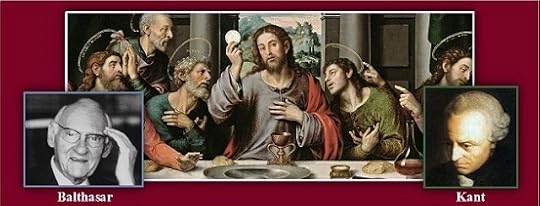Carl E. Olson's Blog, page 93
June 5, 2014
Grill The Priests!
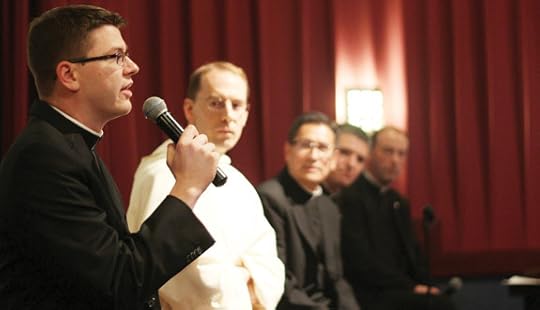
Fr. Ryan Connors, assistant pastor of Our Lady of Mercy Parish in East Greenwich, RI, answers a question from the audience at the recent "Grill the Priest" event organized by the Diocese of Providence’s Office of Evangelization and Faith Formation. (Photo credit: Laura Kilgus)
Grill The Priests! | William Patenaude | CWR
An annual outreach by the Diocese of Providence features food, fun and frank questions with several priests
"Six priests walking into a bar..." could open a joke. But on a Friday night in May, a Dominican and five diocesan priests walked into a Dave and Busters in Providence Place Mall to share a meal with some 150 young people, answer their questions, and witness to the Gospel.
And yes, they occasionally brought the house down with a joke.
“Grill the Priest” is one of many outreach efforts organized by the Diocese of Providence’s Office of Evangelization and Faith Formation. While the intended audience for these question-and-answer events are those in their 20s and 30s, they are open to all—especially if older folks bring a young person who may no longer be practicing their Catholic faith.
Based on similar events in other dioceses, the Providence style of grilling clergy put five priests up front in a theatre-style dining room at a location popular with young people. The clerics sat on bar stools, holding microphones under spot lights, as if they were about to belt out a Frank Sinatra number. But even without song, many in the audience used the word “fun” to describe the event.
“Helpful” was another. Within the confines of the secular, the questions and answers struck to the core of our existence in a fallen world and the salvific activity of an incarnational God who is love.
Proven results
“Young adults take this moment as a great way to invite friends that they know may not be engaged in their faith or parish community,” said Lisa Gulino, whose heads up religious education and evangelization efforts in the Diocese of Providence. She said that several people who attended last year’s event have renewed their commitment to weekly Sunday Mass, and one young man was now coming into the Church.
Monsignor Albert Kenny—the diocese’s Vicar General, Moderator of the Curia, and master of ceremonies at last month’s Grill the Priest—remembers that one young man well. For that event, Monsignor Kenny was up front answering questions. The young man stood and asked whether he should enter the Church. He had been brought up Christian and had been visiting a number of parishes in Rhode Island, but he wasn’t sure if becoming a Catholic was for him.
An IPNovels.com interview with novelist Lucy Beckett
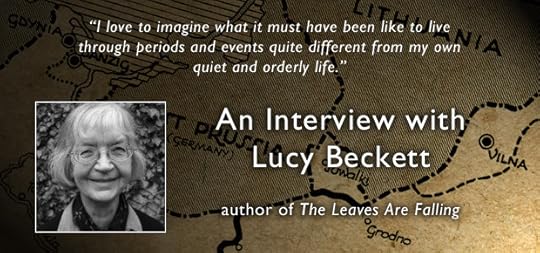
Lucy Beckett is an award-winning novelist living in Yorkshire, England, where she teaches at Ampleforth Abbey. Her novels include The Time Before You Die, A Postcard from the Volcano, and the recently released The Leaves Are Falling. She is also the author of In the Light of Christ: Writings in the Western Tradition.
Ignatius Press Novels interviewed Mrs. Beckett via email.
The Leaves Are Falling is your third work of historical fiction published by Ignatius Press. Why are you interested in the historical fiction genre?
Beckett: I am a historian by training, but I got married very young (age 19), had a lot of children and now grandchildren, live in the depths of the country, and have been a schoolteacher for 40 years (I still teach Latin in the local high school), so I never had a chance to do proper historical research, though I have written academic books on literature and music. So historical fiction is perfect for me: I can read plenty of books at home, and I love to imagine what it must have been like to live through periods and events quite different from my own quiet and orderly life. Because I am a teacher, I also like the idea of helping people to understand better things that they may know little about: the Reformation in England (The Time Before You Die), the descent of Germany into the horrors of Nazism (A Postcard from the Volcano) and now, in The Leaves Are Falling, what really happened on the Eastern front in World War II, where no British or American forces ever were.
This novel provides a lot of details about the historical events of World War II and the events after the war. How much research did you do before writing this novel? Do you have any favorite history books or resources that helped your research?
Beckett: I did a lot of work and read a great many history books. The two authors who were the most help with this new book were Professor Timothy Snyder, now at Yale, particularly his books The Reconstruction of Nations, and Bloodlands: Europe between Hitler and Stalin, and Yitzhak Arad: The Holocaust in the Soviet Union. I read dozens of other books, including all (not very much) that has been written about the Jewish partisans in Byelorussia, and about the Katyn massacre. (Everything that happens in the Soviet prison in the last third of my book is true, and Major Zarubin, the NKVD interrogator, and Rabbi Steinberg, are real historical figures.)
The novel tells the story of Joseph Halpern, an octogenarian book seller who finds a description of his father in a story, and wonders if his own story would be worth telling. Why did you decide to tell Joseph’s story in this novel?
Cardinal Kasper, Communion, and Divorce—Again

German Cardinal Walter Kasper arrives at Rome's Church of St. Anselm in early March. (CNS photo/Maria Grazia Picciarella, pool)
Cardinal Kasper, Communion, and Divorce—Again | Dr. Samuel Gregg | Catholic World Report
The German prelate continues to make unconvincing arguments for his tolerate-but-not-accept propositions
Despite the steady stream of scholarly critiques emerging in response to Cardinal Walter Kasper’s specific proposal concerning the admission to communion of Catholics who have been divorced and civilly-remarried, the German theologian continues to publicly defend his position with statements that are, to put it charitably, very debatable and problematic. The latest examples were cited in a recent article circulated by Religion News Service. To illustrate the contestability of these statements, let’s consider them one by one.
Even a murderer can confess and receive Communion, as Kasper likes to note.
Yes, indeed. A murderer—or a thief, or a liar, or an apostate, or an idol-worshipper, or an adulterer—who confesses his sin and, crucially, resolves to “go and sin no more” (Jn 8:11) is restored to fullness of communion with Christ and His Church. Hence they are in a state whereby they can approach the Lord’s Table to receive His Body and Blood.
That, however, is completely different from, from example, a Catholic who, although sacramentally married to another person, has (1) contracted a civil marriage with someone else, (2) has regular sexual relations with that someone else, and (3) declines to cease engaging in such relations. Such a person is, objectively-speaking, a persistent adulterer.
Christianity has always taught that adultery is an intrinsically evil act, no matter how well-intentioned the participants or extenuating the circumstances. And until a person freely chooses to cease engaging in adulterous acts, he remains in a state of mortal sin. To persist in mortal sin damages our communion with Christ, and this, as no less than St. Paul states (1 Cor. 11:27), has consequences with regard to the sacrament of Communion.
Kasper said he was confident that the process of debate that Francis had launched on the topic of family life and sexuality would in the end produce some significant reforms, in part “because there are very high expectations.”
Pope Francis recently clarified that, like Benedict XVI, he wants to look at the annulment process. That may or may not produce changes in the way the Church handles annulments. But “high expectations” in themselves are not an argument for change in Church teaching or canon law. Some people—most of them, it seems, from Western Europe—may have expectations concerning the admission to the sacrament of Communion of divorced and civilly-remarried Catholics who decline to abstain from sexual acts with their civil partner. Yet as the events surrounding the encyclical recently praised by Pope Francis—Humanae Vitae—illustrated, it is one thing for people, even many Catholics, to have expectations, and quite another for those expectations to be confirmed as consistent with Catholic faith.
He noted that the church has often changed, or “developed,” over the centuries, and quite recently in the 1960s when, for example, the Second Vatican Council reversed long-standing teachings against religious freedom and dialogue with other believers.
Holy Communion as a Matter of Life and Death
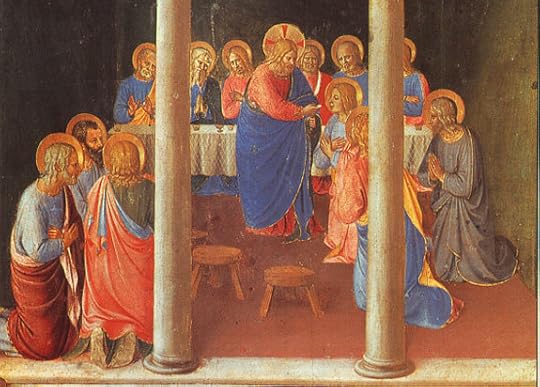
Detail from "Communion With the Apostles" (1451-52) by Fra Angelico (Wikiart.org)
Holy Communion as a Matter of Life and Death | Dr. Leroy Huizenga | CWR blog
Canon law and the Church’s eucharistic discipline aren’t exercises in authoritarian concoction but are rooted deeply in sustained reflection on divine revelation
The reception of Holy Communion is currently a topic of great controversy in the Catholic Church. Bishops generally permit politicians who cross Catholic teaching on grave issues in their public words and actions to continue to receive the Eucharist, and Cardinal Walter Kasper has recently proposed permitting civilly divorced and remarried Catholics to receive the Eucharist as well, an idea that will be taken up at the Synod on the Family in October.
Many Catholics are concerned about these issues, as receiving the sacrament under circumstances involving public scandal and objective sin risk making a mockery of the Church’s discipline and the Eucharist itself. Others of a more latitudinarian attitude worry that withholding the Eucharist in such circumstances risks politicizing holy communion or denying the Church’s chief channel of grace to Christians, as the Eucharist the “source and summit of Christian life” (LG 11; CCC 1324).
One one hand, the Church does teach that Catholics have a general right to the sacraments. On the other hand, the Church also teaches that there are situations in which the sacraments are not to be given or received. While I am not a canon lawyer, and would defer to canonists such as Ed Peters on the canonical issues surrounding the giving and receiving of holy communion (see his excellent discussion thereof in his “Fencing the Altar”), the canonical issues seem clear enough. Canon 915 forbids admitting to communion those “obstinately persevering in manifest grave sin”, while Canon 916 enjoins persons “conscious of grave sin” not to receive communion without confession. Canon 915 thus addresses ministers of the sacrament, practically speaking bishops and priests, while canon 916 addresses would-be communicants. Given these canons, many (including Cardinal Raymond Burke, prefect of the Apostolic Signatura and thus the Church’s “Chief Justice,” and Pope Benedict himself) have asserted that politicians defying Church teaching on life issues ought to be denied communion, while Cardinal Kasper’s proposal to “tolerate” but not “accept” second marriages has precipitated a backlash among his fellow Cardinals, none less than Cardinal Gerhard Müller, prefect for the Congregation for the Doctrine of the Faith.
But in an antinomian age in which refusing anyone anything is seen as mean, adverting to canon law feels like legalism to many. And while Catholics of all Christians shouldn’t disparage or disregard canon law, or laws and rules in general (though many do), it may help to go ad fontes and think about Scripture’s witness to the nature of holy communion and its relevance for Eucharistic discipline. For canon law and the Church’s eucharistic discipline aren’t exercises in authoritarian concoction. Rather, they are rooted deeply in sustained reflection on divine revelation.
June 4, 2014
Note for customers who purchased "Joseph Ratzinger Collected Works: Theology of the Liturgy"
As several readers have noted, the first copies of Joseph Ratzinger Collected Works: Theology of the Liturgy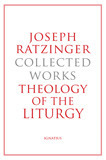 contain pagination errors beginning on page 526. This was due to a printer's error, and we regret the inconvenience.
contain pagination errors beginning on page 526. This was due to a printer's error, and we regret the inconvenience.
Please note that customers who bought the book directly from Ignatius Press will automatically receive new copies and do not need to contact the Ignatius Press warehouse or do anything else.
If you bought the volume from Amazon or elsewhere, you will need to contact the the organization/store from which you made your purchase.
Thank you!
John Paul II Brightens the Earth with His Holiness and Truth
John Paul II Brightens the Earth with His Holiness and Truth | Fr. Zbigniew Tyburski, Ph.D. | HPR
Engaged so deeply in earthly human affairs and believing in each persons’ goodness, John Paul seems to be calling us from heaven with a special request for solidarity of those who live on earth, and those living, though yet unborn.
Being a significant thinker and a moral conscience to the world, Karol Wojtyla—who from 1978 to 2005 was known as Pope John Paul II—provided a clear diagnosis of the moral sickness of man in modern society. At the same time, he drafted a long-term outline for the spiritual and moral renewal that he consequently implemented into the practice of the Church’s life, through all 27 years of his papacy, despite the criticism he faced.
Based on his philosophy that the human being is the pillar of society on its most fundamental level, John Paul II began to strongly promote the concept of “personhood” in the modern world. He reminded us that each human life is sacred, and that men are characterized by a free will and a conscience, both granted by God.
In his first pastoral visit to America, during his homily at Mass on the Washington Mall on October 7, 1979, John Paul said the following words: “I do not hesitate to proclaim before you and before the world that all human life—from the moment of conception and through all subsequent stages— is sacred, because human life is created in the image and likeness of God.” He then strongly underlined his point: “We will stand up and proclaim that no one ever has the authority to destroy unborn life …” (Homily, No. 3 & 6).
The two most important factors by which the human being is characterized are conscience and freedom. Some people recognize conscience as an “inner voice” in the human heart based on natural moral law, by which a person is able to distinguish good from evil, and truth from fallacy. This is a proper understanding, but John Paul II expands upon this definition of the conscience by adding that it is the “most secret core” and our innermost “sanctuary” in which we are “alone with God” to listen to his voice (Tyburski 95). Our conscience, the inner voice from God in every human heart, is the foundation of Christian morality. However, John Paul strongly underlines that “conscience is no lawmaker.” Conscience itself does not create norms, but discovers them from God’s laws.
John Paul II was aware that in the modern secular world, many people have disfigured their consciences, and have false philosophies of human freedom, because of the crisis of truth.
June 3, 2014
Same-Sex Marriage and Parenting: Four Big Myths Debunked

People wave banners as they demonstrate against France's planned legalization of same-sex marriage in Paris April 17, 2013. (CNS photo/Benoit Tessier, Reuters)
Same-Sex Marriage and Parenting: Four Big Myths Debunked | Sister Renee Mirkes | CWR
A rising chorus of voices is rejecting the supposedly settled matter of same-sex marriage and parenting
Popular opinion would have us believe the legalization of same-sex marriage and parenting is a straightforward matter of justice. But not everyone concurs. In fact, the dissenters constitute a rising chorus of voices who identify salient myths smuggled into the ostensibly settled opinion. From one side, the voice of experiential and reasoned testimony from individuals who either identify as homosexuals and/or have been raised by same-sex parents. From another, the voice of empirical evidence from social science researchers. This essay sets their cumulative crescendo center stage.
Myth #1: Only heterosexuals and conservative religious persons are opposed to the legalization of same-sex parenting.
When an interviewer asked Xavier Bongibault whether his opposition to France’s same-sex marriage law arose from religious conviction, he replied: “Absolutely not, I am atheist.” As a homosexual atheist, Bongibault is against France’s new marriage law for the same reason he’s critical of LGBT alliances: it’s homophobic. “The idea that a homosexual must be for homosexual marriage because he’s homosexual” is ideology right out of the play book of a social philosophy that insists gays and lesbians cannot reflect politically, except through sexual instinct.
As it turns out, Bongibault represents the opposition of a sizable segment of the French non-religious homosexual community who are seldom given the microphone. Jean-Marc Ayrault who has lived with a man for 20 years, insists: “The LGBT movement that speaks out in the media . . . doesn’t speak for me. As a society we should not be encouraging [same-sex marriage]. It’s not biologically natural.”
Jean-Dominique Bunel, a specialist in humanitarian law who’s done relief work in war-torn areas, was outraged by the French same-sex marriage law. He admitted to Le Figaro that, after being raised by two women, he has “suffered from the lack of a father,” from the lack of “a daily presence, a character and a properly masculine example, some counterweight to the relationship of my mother to her lover. I lived that absence of a father, experienced it, as an amputation.”
Other adult children of same-sex parents emphasize that their opposition to gay marriage is shared by a majority of the gay community.
June 2, 2014
Beauty and Biblical Interpretation: Hans Urs von Balthasar’s Response to Modern Biblical Studies
by Luke Murray | Homiletic & Pastoral Review
Key to Balthasar’s response to modern biblical studies is his concept of beauty … Balthasar links beauty to human perception, and the way human beings gain knowledge.
Over the past 100 years—amidst the confusion and darkness surrounding the Church’s attempt to evangelize a post-Kantian world—few figures have aided the Church more than Hans Urs von Balthasar. At his death, Cardinal Christoph Schönborn described him as a “thoroughly Catholic figure” with an “incomparable reverence for the Word of God” who found “a sure path between the reductionism of a one-sided use of the historical-critical method and the dangers of fundamentalism.” Schönborn praised his approach to Scripture because Balthasar recognized the “inner unity of ecclesiality and spiritual experience.” 1 Pope Emeritus Benedict (then Cardinal Ratzinger) also confirmed Balthasar’s works, saying that in extending him the honor of becoming a Cardinal, “the Church, in its official responsibility, tells us that he (Balthasar) is right in what he teaches of the Faith, that he points the way to the sources of living water … (he was) a witness to the word which teaches us Christ, and which teaches us how to live.” 2 Finally, St. John Paul II also described Balthasar after his death as “an outstanding man of theology and the arts, who deserves a special place of honor in contemporary ecclesiastical and cultural life” and whose person and life’s work were held in “high esteem … by the Holy See.” 3 While there are certainly controversial areas of Balthasar’s theology (especially his position on Christ’s “abandonment” by the Father), this essay will examine one reason why he was praised by such eminent Catholic theologians. It will examine how the first volume of his series, The Glory of the Lord, entitled Seeing the Form, can help the Church respond to the crisis in modern biblical studies, by appealing to our encounter with beauty. By incorporating the insights of modern historical studies into a hermeneutic of faith, Balthasar provides the light necessary to overcome the problems of the historical-critical method. Furthermore, his project of “theological aesthetics” reveals that Mary should be the model of the Church’s biblical interpretation.
The Problem of Modernity: The Legacy of Immanuel Kant
Few people have influenced modern society more than Immanuel Kant (1724-1804). Building on the work of Bacon, Descartes, and Hume, Kant sought to reconcile empiricists and rationalists in their search for knowledge. While he wrote many things, Kant is best known for establishing the foundation of modernity by absolutizing the split between the person and reality, between the thinking subject and the external object. While an adequate summary of Kant’s philosophy, and the influence of the Enlightenment on modern society, is not possible in this essay, a brief treatment is helpful in understanding how Balthasar’s project responds to Kant, and aids the Church’s biblical hermeneutic in the modern world.
Kant’s legacy is evident whenever one encounters the modern dogma that humanity is cut off from genuine knowledge; that our mind’s innate concepts and categories constitute reality as they impose themselves on an unintelligible reality, like sunglasses shading and constituting our view. According to Kant, man is stuck within the categories of his own mind, and unable to know reality in itself, or what he called the “noumenal” realm. One consequence of this was that the traditional notion of “truth,” as the mind’s conformity with reality, was dismissed as naive conservatism. According to Balthasar, two main traditions in biblical studies developed after Kant.
The Story of the West: Who, Why, and How
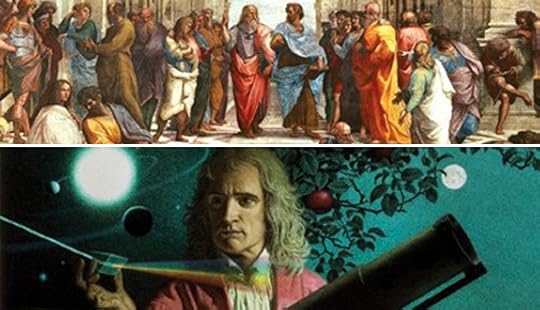
The Story of the West: Who, Why, and How | Gregory J. Sullivan | CWR
Rodney Stark's new book, How the West Won: The Neglected Story of the Triumph of Modernity, relates history that most Westerners have never heard
The impressive book by Baylor University social scientist Rodney Stark, How the West Won: The Neglected Story of the Triumph of Modernity, continues the prolific scholar's fascinating project of bringing social-science rigor (a phrase that is not contradictory in Stark’s meticulous hands) to watershed historical events and epochs.
As with such earlier and well-received works as The Victory of Reason: How Christianity Let to Freedom, Capitalism, and Western Success (2005) and The Triumph of Christianity: How the Jesus Movement Became the World’s Largest Religion (2011), Stark’s lively and absorbing new work beheads the academy’s dictatorship of relativism and enthrones in its place concrete and fact-based understanding in order here to give Western civilization the credit it richly deserves.
Modernity – the centerpiece of this project that Stark defines as “that fundamental store of scientific knowledge and procedures, powerful technologies, artistic achievements, political freedoms, economic arrangements, moral sensibilities, and improved standards of living that characterize Western nations and are now revolutionizing life in the rest of the world” – and its unique development in the West is Stark’s emphasis. That is to say, this book is an investigation of why it happened here and not the Islamic world or anywhere else.
Of course, the advent and astonishing spread and influence of Christianity is at the core of Stark’s analysis.
May 31, 2014
The Isla Vista Killer and the Seven Deadly Sins
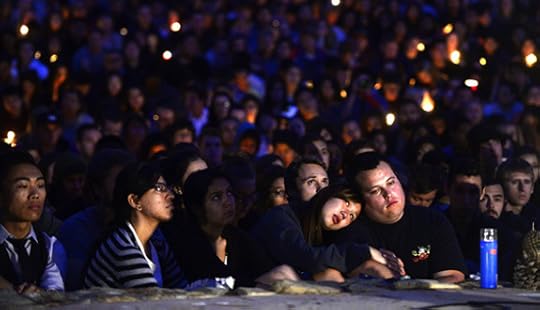
People gather at a park May 24 for a candlelight vigil for the victims of a killing rampage in the town of Isla Vista, Calif., a neighboring community of the University of California at Santa Barbara (CNS photo/Michael Nelson, EPA) (May 30, 2014)
The Isla Vista Killer and the Seven Deadly Sins | Dorothy Cummings McLean | CWR
Sin creates a proclivity to further sin, and then leads to hell on earth
“I am Envy, begotten of a chimney sweeper and an oyster-wife. I cannot read, and therefore wish all books were burnt. I am lean with seeing others eat. O that there would come a famine through all the world, that all might die, and I live alone! then thou should’st see how fat I would be.”
— Doctor Faustus, Scene VI, by Christopher Marlowe (c. 1590)
On Friday, May 23rd, an American college student in Santa Barbara published his autobiography, stabbed his roommates and their friend to death, got into his car and began a shooting spree. He had killed three more people and injured over a dozen by the time he crashed his car and shot himself fatally in the head. He was twenty-two years old.
As family and friends mourn their dead and comfort the injured, pundits debate and argue over the Isla Vista killer’s motives. Some feminists demand that people pay attention to his misogyny. Others put the blame on “white male privilege” (although the killer's mother is of Asian descent). Anti-feminists point out that he killed more men. Many liberals call him a gun nut; some insist he was driven by racism. Some conservatives blame his parents’ divorce; others point to mental illness. After all, his parents’ friends tell the press that the killer had been in therapy since he was nine. The implication is that if the killer was mentally ill, that excuses or fully explains his murderous rampage.
His twisted world
The killer, however, explained his violence in a perfectly lucid and unusually well-written 137-page autobiography, titled “My Twisted World”, that details his life from birth. It begins with the word “humanity” and then the assertion, “All of my suffering on this world has been at the hands of humanity, particularly women.” He claims that he has been “cast out and rejected, forced to endure an existence of loneliness and insignificance, all because the females of the human species were incapable of seeing the value in [him]”. As a matter of fact, by his own admission, the killer was deeply loved and cared for by his mother. He had also an indulgent father, loving grandmothers, a concerned step-mother, two siblings and a best friend who stood by him until the killer’s hate-fuelled rages and fantasies drove him away. But it is the killer’s hatred of humanity, rather than his dismissal of his loved ones, that chills the soul.
Those in favour of stricter gun control in California will search “My Twisted World” in vain for evidence that its author was a gun nut. In fact, he was not familiar with them at all until as a college student he goes to a shooting range to practise for his massacre. He describes the man from whom he rents his handgun as “an ugly redneck” and after he fires his first few rounds at a paper target, he feels sick to his stomach. It is perhaps significant that a memoirist who can describe his childhood Pokémon collection in detail cannot remember the make and model of the first handgun he touched.
The killer wrote that at this moment he asked himself what he was doing there, and how his life could have led to this: “There I was practising with real guns because I had a plan to carry out a massacre.” It would seem that the idea of “real guns” sickened the class-conscious killer as much as his plans did. But in the days following his short target practise, he decides that because “girls are repulsed [by him]”, he will never have children or be a creator, and so might as well be a destroyer. He has been rejected by all humanity, he believes, despite the fact that he is “the ideal, magnificent gentleman.”
And thus humanity must die.
The seven deadly sins
Christians know that there are sins particularly dangerous to human souls.
Carl E. Olson's Blog
- Carl E. Olson's profile
- 20 followers



